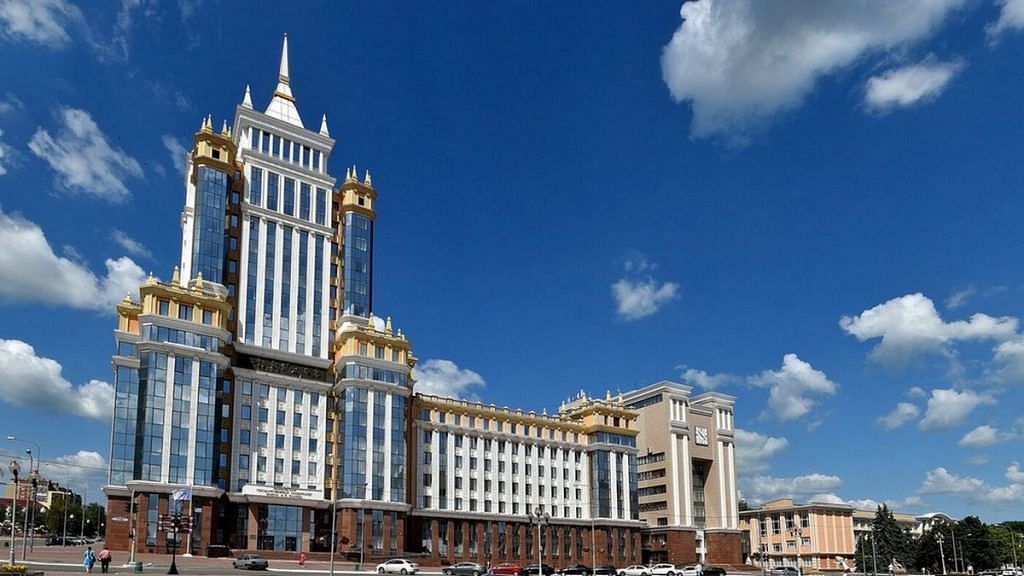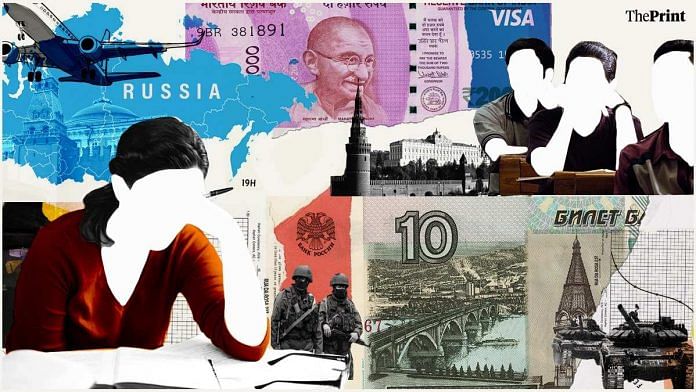New Delhi: The travails of Indian university students stranded in Ukraine in light of the Russian invasion have received intense media coverage. However, their counterparts in Russia are also facing mounting hardships with international and corporate sanctions leading to food shortages, increasing prices, and ATM cards that no longer work, among other issues.
Mansarovar Rai is a fifth-year medical student at Perm State University, set in the freezing and forbidding Ural Mountains. The 24-year-old still goes to classes every morning and returns to cook dinner with his flatmates in his rented apartment near the university, but daily life has grown more and more difficult as the Russia-Ukraine war continues.
Grocery stores now only accept cash, but ATMs have stopped accepting his SBI international card. Visa and Mastercard have also suspended their operations in Russia. Rai’s parents have tried to send cash in dollars with friends who are traveling to Russia but he is yet to receive it.
Some of his batchmates have gone back to India to bring funds, but he is currently surviving on money he borrowed from a Russian classmate.
“For now, I have borrowed money from the parents of one of my local friends but, if this continues, I might have to go back to India just to get cash,” Rai says.
Many other students, especially those who missed out on withdrawing money from ATMs on the day Visa and Mastercard announced their suspension of services, are now struggling to find cash to get by too.
The cost of living in Russia has shot up, too, with the crash in the stock market and the falling exchange rate of the rouble. Food, money transfers, and other necessities now all come at a higher rate, and there are commodity shortages as well.
Indian students in Russia may not have had to boil snow for water as some of their counterparts had to in Ukraine, but they’ve had to take measures like substituting tomatoes with ketchup.
Many students in Russia say these are “minor inconveniences” compared to what students in Ukraine have had to go through, but normal life has undeniably been disrupted and some have returned home.
Also Read: Indians stranded in Ukraine’s Sumy boil snow for drinking water, deny Putin’s ‘hostage’ claim
Cash crunch, but some help at hand
Indian students living in Russia feel no threat to life, but they are feeling the pinch of the sanctions stemming from their host country’s invasion of Ukraine. Many students are desperately looking for ways to convert Indian rupees into roubles, with some landing in an even bigger soup.
One of Mansarovar Rai’s classmates, for instance, lost money on a crypto trading app in an attempt to convert rupees to roubles. “He lost Rs 5,000 in an attempt to trade crypto and convert rupees to roubles. We are all trying to find means through which we can get cash. Though our parents are depositing money in our bank accounts from India, withdrawing this money has become a challenging task here,” he says.
However, there is help at hand, at least in some universities.
At National Research Ogarev Mordovia State University in the western region of Saransk, the campus Indian student representative is helping struggling students get cash.

“We give him money in rupees and he converts it and gives us the equivalent amount in roubles. The amount of money that we can get exchanged is limited though,” a student at the university says, declining to be named.
This student adds that the university is also trying to make the living situation more comfortable: “Our university conducted a survey asking us for feedback. We had requested for free transport and Wi-Fi on campus, which they have now provided.” Further, the university has also started providing one free meal every day to help students cope with the increasing living expenses.
Government data provided to Parliament in 2021 showed that, of the over 11 lakh Indian students studying abroad, 16,500 are in Russia and 18,000 in Ukraine. Many among these are medical students who flock to these countries because of the shortage of seats in India as well as the relative affordability of MBBS courses.
A medical degree in Russia costs between Rs 20 lakh and Rs 27 lakh — much cheaper than private medical colleges in India that charge anywhere between Rs 30 lakh and Rs 1.5 crore.
Shortages, food rationing, but students making do
Vazhayil Jabrul Haque, a medical student from Kerala at the National Research Ogarev Mordovia State University, says he is adapting to food shortages — if tomatoes are out of stock or being rationed at the local department store, for instance, he uses ketchup as a substitute in food preparations.
“We are learning to deal with shortages. Because the problem is only economic, and there is no threat to life, we are tackling it. Since costs outside are increasing, our university has also decided to help us with food, transport, and Wi-Fi.”
At Ulyanovsk State University, 1,000-odd kilometres away from the border at Ukraine’s Kharkiv, where fighting is afoot, 21-year-old Sakshi Shingala is watching every penny she spends.
“Prices of basic necessities like food and clothes have increased significantly. As students, surviving has become difficult,” she says. Getting money transferred through SWIFT, the international payment gateway, has also become more expensive, she adds, because rupees have to be converted to dollars and then to roubles. “This mounting transfer charge just adds to the burden of increased cost of living.”
Visa and Mastercard control nearly 90 per cent of credit and debit card payments of the world, but earlier this month they blocked their services in Russia as part of the raft of Western sanctions imposed on Moscow. International food brands like McDonald’s, Coca-Cola and Starbucks, too, have suspended operations in the country.
According to a BBC report, consumer prices in Russia jumped 2.2 per cent in the first week of the invasion, with food registering among the biggest rises. Some shops are restricting the sale of staples, after reports of hoarding, and citizens have reportedly had to queue up for essentials such as sugar.
Students say that the Russian government has started rationing supplies of necessities that they import, and residents cannot buy as much as they please.
One thought that helps many students cope is the knowledge that they are not in physical danger.
“I know that getting money has become difficult and food prices have increased but inside our campus we are safe. We wake up normally and go about our day — the situation is not as bad as Ukraine,” a final-year student in North Ossetian State Medical Academy says.
“We are facing some difficulties but as students, we know how to live on a tight budget,” she adds.
Most students sticking it out, a few leaving
Most students in Russia are staying put, partly because they feel they can handle the challenges they are facing but also because they believe going home to India and taking online classes could harm their future prospects.
In February, India’s National Medical Council announced that it does not “recognise nor approve” medical courses done only in online mode.
Nevertheless, some students, especially in the first and second years of their medical education, have returned home due to worries about money and the war.
On 20 March, for instance, 10 students of Ulyanovsk State University came back to India, followed by another 35 four days later.
Sneha Mankar, a 21-year-old second-year student, who decided to come back in the batch that left on 20 March, said she did it because her parents were worried about her dwindling cash supply and the conflict. “I am back at my home in Maharashtra and am currently attending my classes online,” she says.
Sneha is worried that with the latest NMC rule on online education she may not be able to appear for her Foreign Medical Graduates’ Exam (FMGE) — which students with foreign degrees from certain countries must pass to practise in India — but is trying to maintain a positive mindset.
“I am hoping that this rule is only with reference to Indian students in China, where they didn’t get to do any practical studies,” she says.
In Perm State University, about 100 students have already left the campus for India, citing cash crunch and increased cost as the reason.
“Students need to sign a no-objection certificate with their university and then they can fly back to their home country. They can then attend courses online, but how long will that last?” asks a student, wishing to remain anonymous.
Most students in the final year of their medical education, however, have decided to stay back because they want to be eligible for the FMGE, which they believe is essential for their career.
Meanwhile, many parents of students who have stayed back are growing increasingly concerned.
“We are constantly worried for our daughter’s well-being. We even asked her to come back to India and go back after the war ends. Every day the news shows other countries condemning Russia… you never know when attacks in the states will spread,” the mother of 21-year-old Sakshi Shingala of Ulyanovsk State University says.
(Edited by Asavari Singh)
Also Read: First China, now Ukraine: Doctor dreams up in smoke for many as Covid & war deal twin blows



